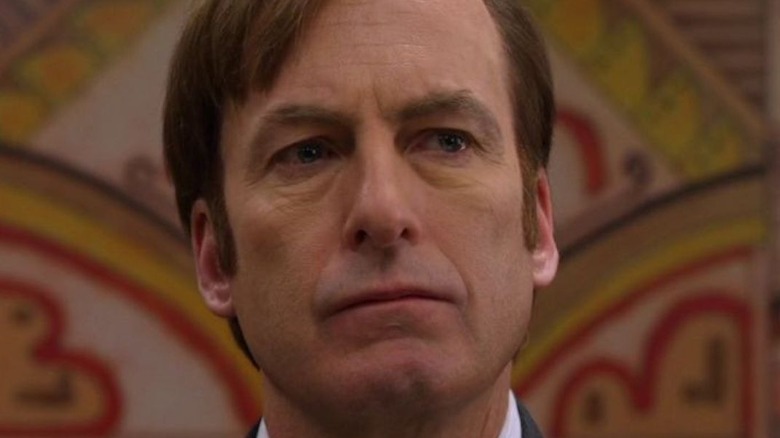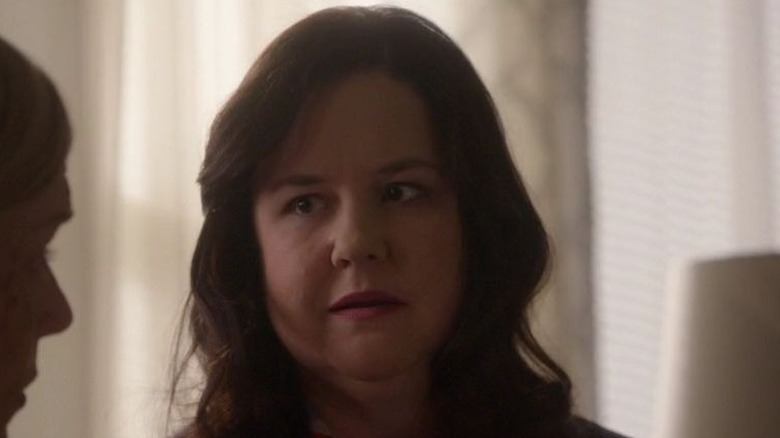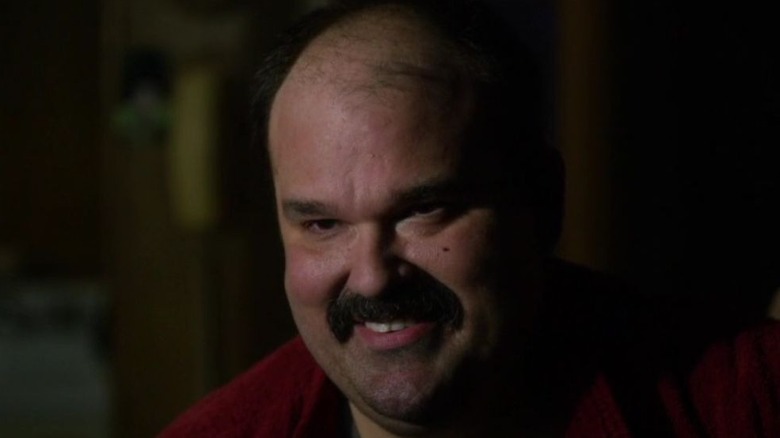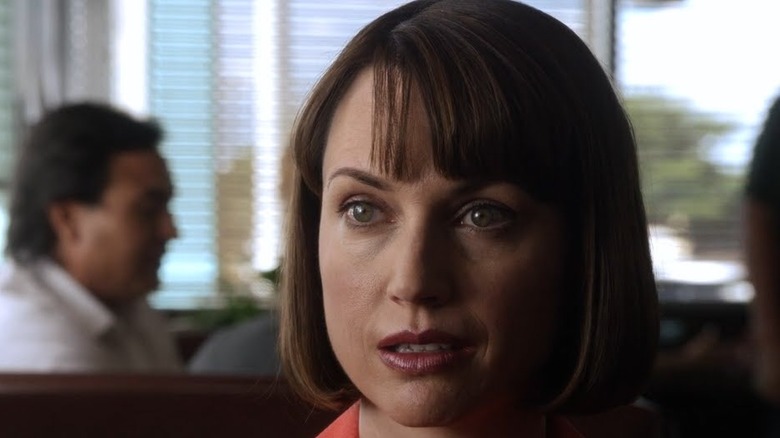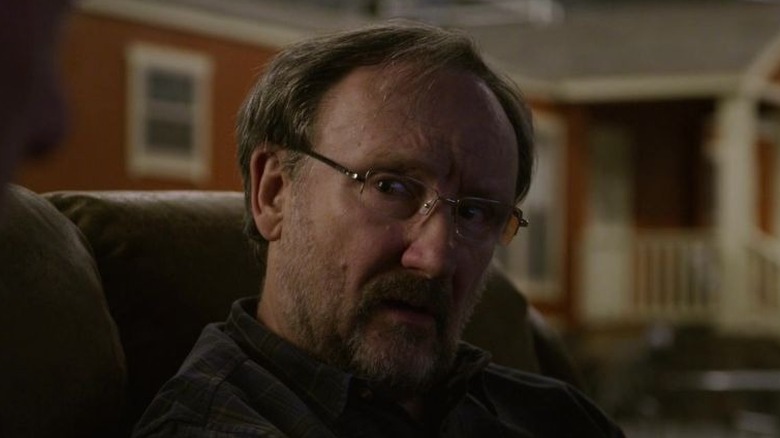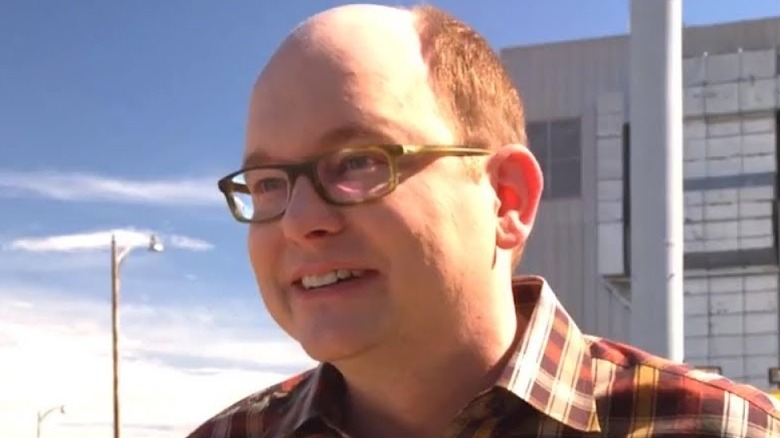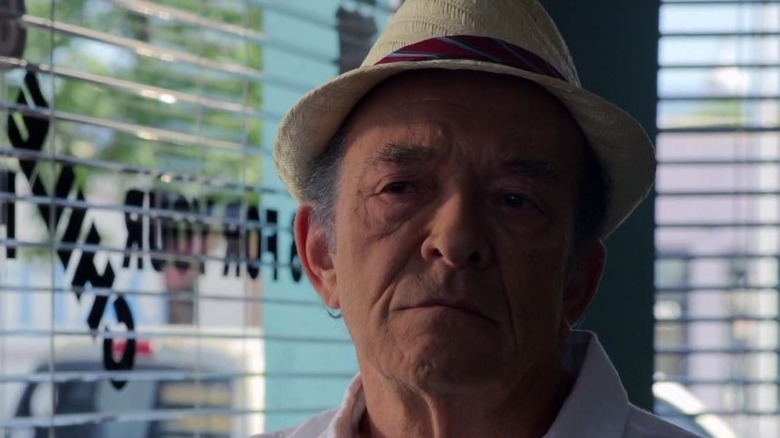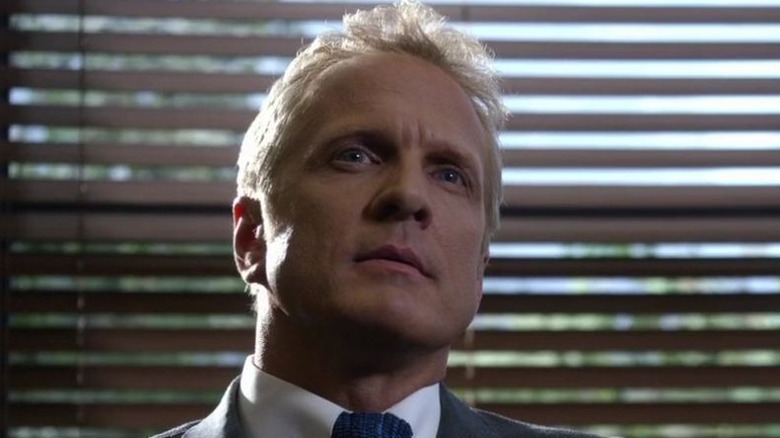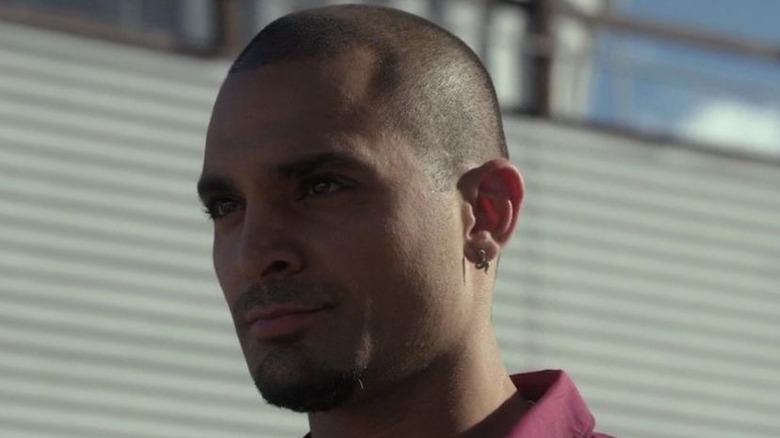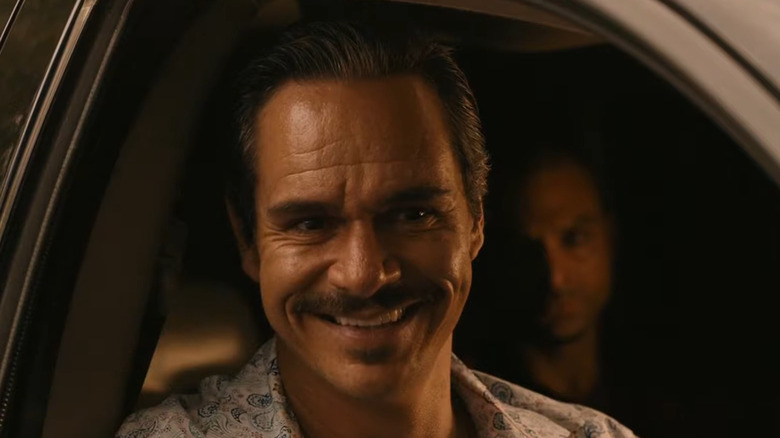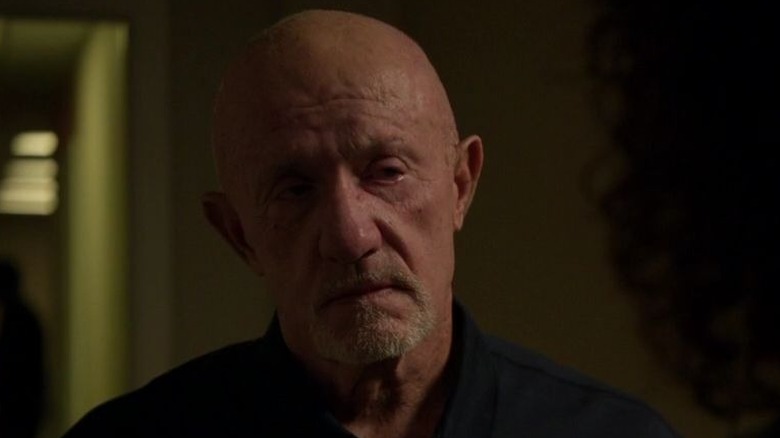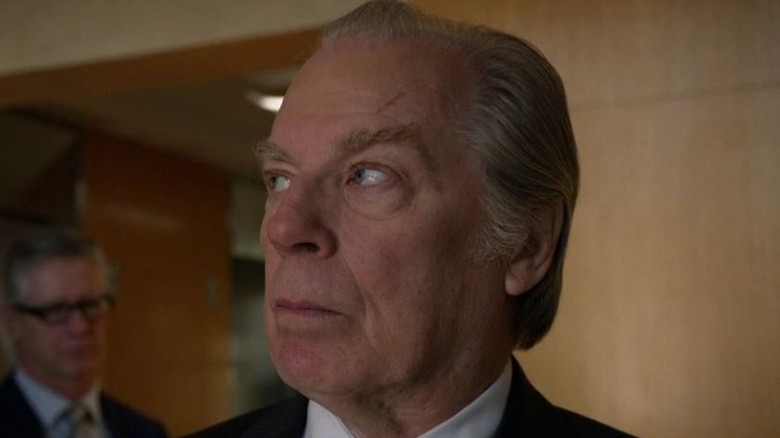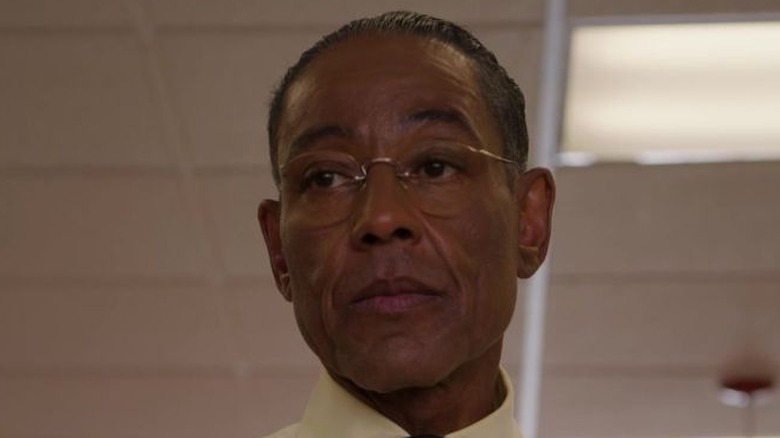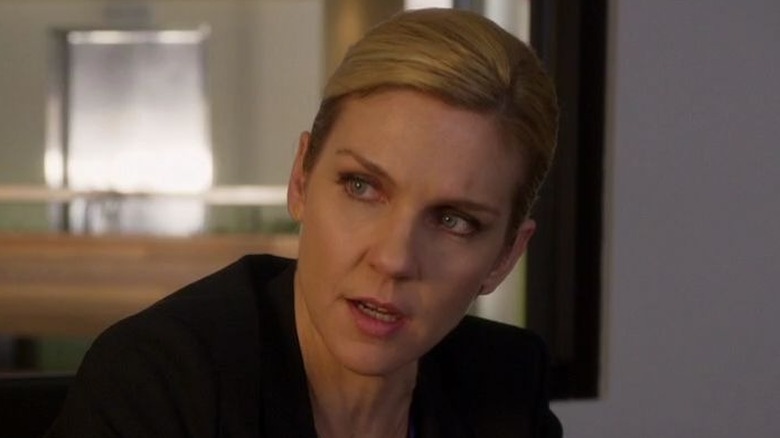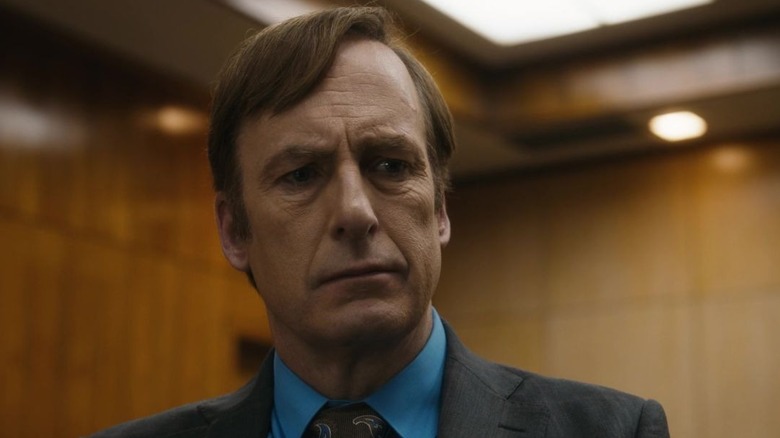Better Call Saul's 14 Best Characters Ranked
Welcome to Vince Gilligan and Peter Gould's Albuquerque, home to sinister criminals, lost souls, and one motormouth attorney in a garish suit. The acclaimed television crime thriller "Breaking Bad" introduced viewers to a world so full of memorable characters that fans demanded a return trip in the prequel series "Better Call Saul." "Saul" not only reveals the backstory of "Breaking Bad's" fast-talking criminal lawyer (which here means "lawyer who's a criminal"), but also delves deep into the lives of other familiar figures in the New Mexico underworld. How did "the Chicken Man" Gus Fring build his criminal empire? What turned ex-cop Mike Ehrmantraut into the Oscar the Grouch of crime? Over the course of six seasons, "Better Call Saul" adds greater depth to its sister series and spins a compelling, intense character drama of its own, complete with a slew of fascinating original characters and concepts.
In commemoration of the series finale, we're ranking our favorite "Better Call Saul" characters, no easy task considering the wealth of candidates. For the sake of our list, we're judging characters strictly based on their appearances on "Better Call Saul," disregarding (as best we can) their contributions to "Breaking Bad." This means discarding anyone who merely cameos in the prequel (like Walter, Jesse, Hank, and "Gomey"), and knocking characters whose best material is on the other show. (Our deepest apologies to Lavell Crawford as Huell Babineaux, who appears in both shows but whose highlights are mostly on "Breaking Bad.") It's a competitive field, but there could be only one winner — and if you don't like it, sue us.
14. Francesca Liddy
Introduced in Season 2 of "Breaking Bad" and portrayed by Tina Parker, Saul Goodman's beleaguered office assistant has been around for as long as Saul himself. "Better Call Saul" shows us how she became part of the business, beginning as a friendly receptionist at the mostly-legitimate Wexler/McGill offices. She's just a regular gal from the Motor Vehicle Department looking for a better gig, and she finds it, at least for a time. The Francesca of "Better Call Saul" is good-natured and kind, a great help to Kim after her terrible car accident. When Wexler/McGill folds, Jimmy promises to rehire her when he sets up shop again, and he keeps that promise, though she probably comes to wish that he hadn't.
While Francesca doesn't play a major role in any pre-"Breaking Bad" storylines, her appearances on both ends of the "Better Call Saul" timeline show us how Jimmy's decay into the amoral Saul Goodman has changed everyone around him. We get only a brief glimpse of "Breaking Bad"-era Francesca during "Better Call Saul," but it makes a big impact, especially when Saul sexually harasses her in front of Kim during their divorce proceedings. Jimmy was once Francesca's advocate, but Saul is her abuser. She's locked in his orbit, stuck working for a jackass who publicly mistreats her as part of theater of being Saul Goodman. One wonders if his constant demeaning name-calling of Francesca is an effort to try and deliberately spoil and bury any fonder memories from the only other person in his life who remembers the old Jimmy McGill.
On the bright side, Francesca appears to be the only person connected to Walter White's criminal operations who got to keep any of the money, now owning and managing an apartment building as seen in the "Better Call Saul" episode "Breaking Bad."
13. Marco Pasternak
Marco (Mel Rodriguez) is Jimmy McGill's oldest friend, and his partner from the old "Slippin' Jimmy" scam days. The pair grew up together in Cicero, Illinois, where they develop their repertoire of repeatable short cons to pull on strangers in bars. (Their early Catholic school misadventures are the subject of the animated web series "Slippin' Jimmy.") Jimmy leaves Marco behind when he follows his brother Chuck to Albuquerque, eventually becoming an attorney. Without his partner, Marco is forced to go straight and become a standpipe technician, which bores him to tears.
The light briefly returns to Marco's eyes when Jimmy visits Cicero at the end of Season 1, and the pair picks up their old tricks. Their week of fun ends when Marco suffers a fatal heart attack during one of their scams. Marco, however, has no regrets, telling his friend that their recent adventure was the best time in his life.
Marco may only appear in three episodes of the series, but Jimmy carries his memory with him everywhere, represented by the tacky pinky ring left to Jimmy after his death. It's a totem Jimmy ponders often while making difficult decisions, one that reminds him that his friend would rather break the rules and burn out fast than live a slow, unglamorous life within the margins.
Marco's fate is also a forecast of the dangers that lie ahead for Kim Wexler, another close companion of Jimmy's who gets swept up in the thrill of the con.
12. Betsy Kettleman
Many of the recurring guest stars on "Better Call Saul" are richly textured tragic figures who personify the greater struggles of the main characters. One of the show's greatest strengths is its ability to grant novel-like depth to even the most incidental figures. On the other hand, sometimes a character can be more entertaining for being stubbornly, impossibly one-note. Betsy Kettleman, wife of embezzling Albuquerque city treasurer Craig Kettleman, has basically one speed, and it's "total denial." The center of one of the first season's running plot lines, Betsy is convinced that she and her husband can escape the consequences of their actions because they're simply "not criminals," meaning that they're rich white people.
Where most of the characters on the show are more entertaining because they contain hidden depths, Betsy Kettleman slays because she's totally predictable, something that Jimmy and Kim are able to exploit when she and Craig reappear in the show's sixth season. Julie Ann Emery and Jeremy Shamos essentially function as a comedy duo in their roles as Betsy and Craig, but it's Emery who takes the big swings and wins the laughs.
11. Werner Ziegler
This poor guy. A German engineer recruited to design and lead construction of the mother of all meth labs, Werner is confined with the rest of his team for months on end in a makeshift neighborhood hidden beneath Gus Fring's industrial laundry. The project's timetable faces multiple extensions, keeping him away from his beloved wife Mathilde for much longer than anticipated. He bonds with the team's keeper, Mike Ehrmantraut, who negotiates some wiggle room in his initial policy that the construction crew should have no contact with the outside world. Werner crosses the line when he escapes the compound in an attempt to visit Mathilde for a weekend. In order to protect the secrecy of the project, Mike has little choice but to execute his friend before he's reunited with his wife.
Werner, portrated by German actor Rainier Bock, is a sweetheart, a father figure to his engineering crew. For our purposes, he's most importantly a friend to Mike, a man with very few companions. Mike makes allowances in order to make Werner's isolation more bearable, but soon learns that the business he's in leaves no room for mercy or kindness. (As Mike becomes fond of saying on "Breaking Bad," there can be no half-measures.) Up to this point in the series, Mike has been able to find ways around killing. This time, he has no choice. He's never the same after.
10. Pryce, aka Daniel Wormald
"Breaking Bad" is the story of an unassuming nerd becoming a merciless drug kingpin, frequently highlighting the collision of the menacing and the mundane. "Pryce," a.k.a. Daniel Wormald, is practically a parody of "Breaking Bad's" Walter White, a cartoonishly nerdy pharmaceutical worker who starts selling his company's inventory on the black market. Unlike the famously cautious Walt, Pryce suffers from an utter lack of self-awareness, flaunting his ill-gotten gains in the form of a flashy Hummer H2 and underestimating the dangers of his new business partners. It's only thanks to Mike Ehrmantraut, who he hires as a bodyguard, that he doesn't end up dead.
Pryce provides much-needed comic relief to the often grim world of crime depicted on "Better Call Saul," and a foolish foil to Mike's stoic pragmatism. Actor Mark Proksch makes a strong impression in just five episodes (we'll never read the words "baseball cards" in any other voice but his), before taking his bland nerd persona across the street to FX to become the energy vampire Colin Robinson on "What We Do in the Shadows."
9. Hector Salamanca
When Mark Margolis first appears as Hector Salamanca during Season 2 of "Breaking Bad," his character has already suffered a stroke that leaves him unable to express himself verbally. Forced to communicate using a bell attached to the arm of his wheelchair, Hector could easily have been more of a prop than a character. Thanks to Margolis' compelling silent performance throughout that series, he became a crucial supporting character who participates in one of "Breaking Bad's" most iconic moments — the end of Gus Fring.
On the prequel "Better Call Saul," Margolis gets the chance to play Don Hector before his body fails him, when he's still Fring's primary rival for control of the meth trade in the American Southwest. Hector is a creature of pure malice, an old-school gangster whose love extends only as far as his bloodline, and even then just barely. Hector is the show's villain during its middle seasons, and his brutality allows "Better Call Saul" to frame the comparably civilized criminal mastermind Gus Fring as one of the show's protagonists.
Don Hector is one of the characters whose portrayal on "Better Call Saul" only adds depth to his arc on "Breaking Bad." Initially, we could witness only a fraction of his rage. Now, we see its full measure.
8. Howard Hamlin
Five years ago, who'd have guessed that we'd be crying over Howard Hamlin? When he's introduced at the beginning of "Better Call Saul," portrayed by Patrick Fabian, he's a textbook stuffed shirt, a second-generation name law partner and the polar opposite of Jimmy McGill. (And at this point in the series, we like Jimmy.) As the seasons progress, however, we gradually learn that Howard's seemingly condescending approval of Jimmy's law career is actually genuine, that it's not Howard but Chuck who has been throwing obstacles in Jimmy's path. Howard turns out to be one of the most patient, honorable, and well-meaning characters on the show, but that doesn't stop Jimmy and Kim from torturing him whenever possible.
To begin with, Jimmy gleefully allows Howard to carry the terrible guilt of triggering his mentor Chuck's suicide, something for which Howard sincerely and desperately wants to atone. Jimmy hates Howard for the same reason Chuck hated Jimmy — Howard had Chuck's respect, and Jimmy never did and never will. Next, when Howard makes the fatal mistake of implying that Kim is a helpless victim of Jimmy's cons rather than a participant with agency, she decides to prove him wrong by actively destroying his life. Fun as it often is to see this grown-up rich kid fall victim to well-executed pranks, his final fate is heartbreaking.
7. Nacho Varga
"Better Call Saul" has no shortage of tragic characters, and Ignacio Varga's story is particularly brutal. When we meet Nacho (Michael Mando), he's partnered up with the Salamanca family's loose cannon meth baron, Tuco. Nacho is his better half, a thoughtful and even-tempered gangster among insecure hotheads. Unfortunately, this puts him and his beloved father in danger from both the Salamancas and Gus Fring's organization. Nacho works behind the scenes (with some help and advice from the likeminded Mike Ehrmantraut) to remove the ferocious Salamanca leadership, getting Tuco sent to prison and replacing Don Hector's heart medication, leading to his debilitating stroke. While the viewer recognizes that Nacho has done the world a favor, he has also meddled in Gus Fring's decades-long revenge scheme against the Salamancas, and is made to suffer for it.
Part of what's tragic about Nacho is that he would likely have fit perfectly into Gus Fring's organization in the first place. He's cunning, professional, and disciplined, exactly the sort of man Fring likes to work with. Mike sees it, too, but is unable to talk Fring out of using Nacho as an expendable pawn in his war against the Salamancas.
6. Lalo Salamanca
As much as we enjoy complex, nuanced characters, there's something hypnotic about a pure psycho with no soul to speak of. Lalo Salamanca (Tony Dalton) enters the story to take over the cartel's business in Albuquerque after Hector Salamanca's stroke. In contrast to Tuco and Hector's hot tempers, Lalo is cool as a cucumber, a brilliant tactician and something of a detective at heart. Lalo instantly suspects that Gus Fring is working on some grand scheme to take over the meth trade and, exercising great patience and intellect, comes extremely close to exposing his plans. He's the only high-ranking representative of the cartel who's a match for Fring, and it almost pays off for him.
However, in other respects, the apple has not fallen far from the tree. Lalo is selfish and greedy and kills without blinking. He takes joy in everything he does, including murder. Lalo is a charming, friendly guy when he wants to be, but there's absolutely nothing behind it apart from self-interest. To Lalo, human beings are just another thing he can use. He's protective of a few people, but only because he believes they belong to him. As a foe, this makes him incredibly dangerous. For the viewer, it makes him scary, funny, and endlessly entertaining to watch.
5. Mike Ehrmantraut
Mike Ehrmantraut might be the saddest man on the face of the Earth. Introduced on "Breaking Bad" as a stoic and pragmatic fixer working for both Saul Goodman and Gus Fring, "Better Call Saul" reveals the tragic backstory and bleak inner life of Jonathan Banks' memorable stick in the mud. Mike is driven by pain and regret over the death of his son, who was murdered by two fellow cops for hesitating to accept drug money. Mike's last word of advice to his son was to play ball at the expense of his honor, and he was killed anyway. After avenging his death, Mike tries to continue his life in a way that his son would respect, but finds that to be impossible under his present circumstances, and he hates himself for it.
When we find him on the prequel series, he reluctantly involves himself in Albuquerque's drug trade as a bodyguard in order to help support his daughter-in-law and granddaughter. As he digs deeper and deeper into the criminal underworld, Mike always insists on doing everything the hard way rather than the bloody way. His caution and professionalism earn him a place at Gus Fring's right hand, but as the stakes get higher for Fring's business, it becomes more difficult for Mike to avoid killing. In the latter half of the series, Mike is unable to negotiate a merciful end for either Werner Ziegler or Nacho Varga. By the end of the series, he's all out of effs to give.
4. Chuck McGill
Throughout the series, "Better Call Saul" plays with the juxtaposition of decency and honor. Charles McGill is a pillar of decency, the most superficially respectable person in the world. He's an intellectual genius, a successful and prosperous attorney, someone who holds the law in the highest esteem. At the same time, being the smartest man in any room his entire life has given him a colossal superiority complex and an unshakable belief in his own infallibility. People can smell this on him, which is why everyone — even his own mother — loves his rotten, lying brother Jimmy more than they love him. Chuck can't understand this, and it destroys him.
Despite all his apparent decency, despite his playing by the rules and working within the social contract, Chuck ultimately has no honor. For years, Chuck secretly undermines Jimmy's law career and allows his closest friend and mentee, Howard Hamlin, to take the blame for it. All the while, Chuck relies on Jimmy to care for him while he struggles with a psychosomatic allergy to electricity. Chuck sees no hypocrisy here — After all, he's a genius, a scholar, a self-made man, while Jimmy is a joke, a parody of everything he values. Why should he ever treat him as an equal?
Of course, when this deception is discovered, Jimmy takes revenge by systematically destroying Chuck's life. Like nearly every character on "Better Call Saul," Chuck elicits great sympathy and doesn't deserve his terrible fate. But he's also a truly contemptible man, someone who's willing to do anything so long as it's within the bounds of the law, which often proves to be a poor way to measure right and wrong.
3. Gustavo Fring
It's remarkable to look back a decade and see how the character of Gus Fring came to be. When Tuco Salamanca actor Raymond Cruz had to leave "Breaking Bad" due to a scheduling conflict, series creator Vince Gilligan and his team were forced to reimagine the show's trajectory. Rather than continue the story with a different actor as Tuco or replace him with a similar character, the storytellers chose to create a new antagonist that was his total opposite. Thus Gus Fring, the perfect, polished professional crime lord, was born. Portrayed by the incomparable Giancarlo Esposito, Fring would become one of the most fascinating and popular television characters of his time.
While Fring was the chief villain of Seasons 3 and 4 of "Breaking Bad," the prequel series "Better Call Saul" positions him as a protagonist, following the growth of his empire and his secret revenge plot against the Salamanca crime family. Fring is still a cold-hearted killer, but is easy to root for simply because it's incredible to watch him work. He's so brilliant, so methodical, so many steps ahead of any particular obstacle, that you can't help but feel like he deserves to succeed. And since his opponents are the ruthless Salamancas, who murdered his partner Max in front of him, the audience can share in his satisfaction. Gus may once have been content to make a living manufacturing meth for the cartel and managing a chain of chicken restaurants. But once Hector Salamanca and Don Eladio took Max from him, Gus made it his mission to take everything from them and to make the process as slow and painful as possible. He becomes a kingpin out of pure spite, and he's very, very good at it.
2. Kim Wexler
We'll level with you: we very nearly put Kim Wexler on the top of this list. Kim is the soul of "Better Call Saul," the character who embodies the struggles and the stakes of the series. Rhea Seehorn's performance is arguably the show's best, and that's truly saying something. Kim is fascinating from the very beginning, as we get to know this talented, compassionate, hard-working attorney and try to suss out just why she's so keen on spending her time with "Slippin' Jimmy" McGill. For a time, one might have been forgiven for mistaking her for a fool, blinded by love and trusting Jimmy against her better judgment. One person who would not forgive that mistake would be Kim herself. (See: Howard Hamlin.) She knows exactly what she's doing, and she doesn't want your approval or permission. What Kim wants is to feel as if all her years of work will add up to something of value, and to be allowed to enjoy it.
Kim works herself nearly to death becoming an incredible, reliable attorney, hoping this will bring her fulfillment in life. Eventually, she finds that running herself ragged for the benefit of some banker has only left her feeling empty, and that doing the work that makes her happy will eventually leave her broke. What, she has to wonder, was this all for? Running scams becomes a salve, allowing her to secretly tax her upper-crust clients and colleagues, not only because it finances her pro bono work, but because it feels good. Being with Jimmy gives Kim the same thrill that the audience gets from watching, but even as we marvel at the brilliance of her long cons, we wince because we know that this can't possibly end well for her. And, of course, it doesn't.
1. Jimmy McGill
When "Breaking Bad" came to an end in 2013, fans were already clamoring for a spinoff about Bob Odenkirk's breakout comic relief character, slimy lawyer Saul Goodman. No one, not even creators Vince Gilligan and Peter Gould, initially imagined that this spinoff would be as intense and emotional as its sister series, and reveal Saul — or rather, Jimmy McGill — to be one of the most complex and textured protagonists on television. Instead of leaning into the humorous misadventures of a criminal lawyer, "Better Call Saul" digs into the man behind the colorful suits and shady connections to reveal a deeply flawed and deeply sympathetic man who simply can't stop digging deeper holes for himself. Over the course of six seasons, we watch the untrustworthy but also kind of sweet hard-luck antihero destroy himself, first by accident and then on purpose.
As Gilligan and Gould explained in a 2022 interview, the central question of "Better Call Saul" became "What problem does being Saul Goodman solve for Jimmy McGill?" In the final episodes of the series, we come to understand how the man we met on "Breaking Bad" could be so different from the one we've come to know on his own series. The best part of Jimmy McGill was Kim Wexler. Without her, he'd rather not even think about Jimmy McGill at all. Better to look in the mirror and see someone else, someone who doesn't give a damn about anyone, someone who neither Kim nor anyone else could ever trust or love. He invests only in himself, and no one invests emotionally in him. It's easier that way.
